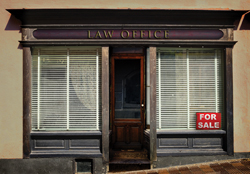Legal Ethics
Ethics opinion: It's OK to 'practice' after selling a law practice to assist in the transition

Shutterstock.com
Things changed starting in 1990, when the ABA House of Delegates approved a revision to the Model Rules of Professional Conduct.
Under the new Rule 1.17, a lawyer or law firm may sell or purchase a law practice, or an area of law practice, including goodwill, subject to certain specific conditions: The seller must cease practicing in the area of practice being sold in the jurisdiction or geographic area in which the lawyer had conducted the practice; the entire practice, or area of practice, is sold; the seller gives appropriate notice to clients affected by the sale; and fees charged to clients may not increase because of the sale.
Since then, Rule 1.17 has been adopted in some version by state jurisdictions throughout the country. The Model Rules are the basis for binding professional conduct rules in every state, although California follows a different format. But even after some 25 years on the books, Rule 1.17 still raised some unanswered questions. In October, however, the Standing Committee on Ethics and Professional Responsibility issued Formal Opinion 468 to resolve one of those issues.
Despite the requirement that a seller stop taking cases in the area of practice being sold, the committee states in its opinion, “a question has arisen as to whether a selling lawyer or law firm may nevertheless continue to ‘practice’ to assist the buyer or buyers in the orderly transition of active client matters.”
The answer, the committee concluded, is yes. “The requirement of Rule 1.17(a) that the seller of a law practice or area of practice must cease to engage in the private practice of law, or in the area of practice that has been sold, does not preclude the seller from assisting the buyer or buyers in the orderly transition of active client matters for a reasonable period of time after the closing of the sale,” the opinion states. “However, neither the selling lawyer or law firm nor the purchasing lawyer or law firm may bill clients for time spent only on the transition of matters.”
THE RIGHT AMOUNT OF TIME
The committee linked its finding to the underlying purpose of Model Rule 1.17. The primary purpose of the rule was to eliminate disparities in how clients of law firms and sole practitioners were affected by the departure from practice of a lawyer responsible for a client matter. Prior to adoption of Rule 1.17, a law firm could assign a client to another attorney at the firm. But “clients of sole practitioners were left to fend for themselves after their lawyer left the practice because the lawyer had no legal way to sell the practice,” states the opinion. Model Rule 1.17 also allowed sole practitioners to transfer clients to a purchasing lawyer or firm through the “goodwill provision.”
But Rule 1.17 did not address the timing of when a seller “ceases to engage” in the private practice of law for purposes of helping the purchasing lawyer and clients through the transition to new ownership of the practice.
In its opinion, the ethics committee states that, under the rule, “the selling lawyer may no longer accept new matters in the relevant practice or area of practice, and that prohibition should logically take effect immediately upon the closing of the sale. However, given the history and purpose of the rule, as well as the black-letter provisions and comments to the rule, it seems reasonable to conclude that the transition of pending or active client matters from a selling lawyer or firm to a purchasing lawyer or firm need not be immediate or abrupt.”
Just how long any transition should take in any particular client representation “will necessarily depend on the circumstances,” the opinion states. “It is therefore impractical to propose any prescriptive time limitation for when the selling lawyer ‘ceases to engage’ in the private practice of law in the relevant practice area or jurisdiction following the sale of a law practice or area of law practice.”
But regardless of how long the transition takes, the opinion emphasizes that “clients should not experience any adverse economic impact from the sale of a practice or area of practice.”
This article originally appeared in the March 2015 issue of the ABA Journal with this headline: “Set Sale: ABA ethics opinion holds that a lawyer selling a practice may take time to assist in the orderly transition of client matters to the purchaser."



